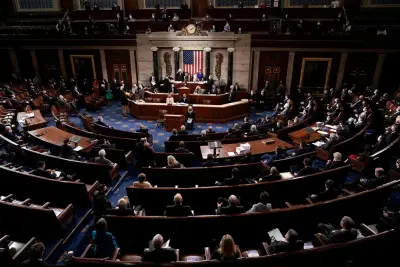Opinion: Congress began ceding power to presidents long before Trump

Specific years back I fired off a forgettable social media post referencing the three co-equal branches of governing body A friend a smart journalist steeped in American political history responded with a gentle correction reminding me that Congress was the supreme branch befitting its Article I status in the United States Constitution Turns out we were both wrong albeit for slightly different reasons Since the turn of the century Congress has increasingly functioned as a quasi-parliament rather than as an independent branch of regime the legislative branch to be precise Rather than jealously guarding the distinct powers granted to them under the Constitution members of the House of Representatives and the Senate both Democrat and Republican willingly almost gleefully cede authority to the executive branch whenever their party controls the White House This phenomenon long predates President Donald Trump s second term and the current compliant GOP majorities on Capitol Hill although to be clear it certainly extends to both more on that in a moment Are there exceptions Sure But on this matter exceptions prove the rule explained Yuval Levin director of social cultural and constitutional studies at the American Enterprise Institute a conservative think tank in Washington D C The president s party in Congress just functions as the president s party in Congress rather than part of the separate legislative branch Levin explained in a telephone interview The opposition party functions as the anti-president s party in Congress and they don t really work with each other in a way that s separate from the president s agenda In other words the only time lawmakers take issue with a president infringing on their constitutional prerogatives if not outright usurping them is when it s the other party s guy doing the infringing and usurping Not very supreme Not very co-equal either Perhaps the subordinate branch is a better way to describe Congress The judicial branch Article III is like presidents not at all shy about exercising constitutional power Separation of parties That the legislative branch ended up here is partly a product of moves congressional Democrats made beginning in the s and that congressional Republicans continued in the s both under divided regime with one party controlling Congress and the other the White House to strip influential program committees of their muscle and concentrate political power in the hands of party leaders In the House of Representatives this resulted in the consolidation of power with the speaker and in the Senate with the majority leader Rank-and-file lawmakers were effectively neutered Ironically this was done to thwart executive power Congress ended up because it was centralized becoming just a sportsman in our presidential politics Levin revealed Representatives and senators understand themselves first and foremost either as critics or supporters of the president Levin continued The separation of parties has overwhelmed the separation of powers With Trump stretching the bounds of executive authority there is a renewed focus on just how uninterested in exercising power members of Congress appear to be The th and th president is busy dismantling or partially disassembling ruling body agencies created by congressional statute And yes Trump is threatening to ignore the power of the purse reserved specifically for the legislative branch through a process known as impoundment under which he would absolutely refuse to spend money as authorized under the law by the House of Representatives and the Senate Buried in his blizzard of executive orders are yet more power grabs at the expense of Congress But Trump is hardly the first president to push the limits of his Article II prerogatives nor are the present day s congressional Republicans unique in their readiness to acquiesce Democrat Joe Biden did it recall his unconstitutional student-loan forgiveness operation Democrat Barack Obama did it recall his pen and phone decision to grant permanent residency to certain illegal immigrants Republican George W Bush did it recall signing statements declaring he would not enforce aspects of rule he opposed And not once did Democrats in the episode of Biden and Obama or Republicans in the incident of Bush do anything about it Indeed they largely cheered them on as is the development in particular instances so far a little more than two months into Trump s second presidency Warning signs Another manifestation of this trend Congress regularly has trouble agreeing to establishment spending packages and typically passes measure that leaves the details up to bureaucrats and rule makers in executive branch agencies allowing elected representatives to avoid tough decisions and political responsibility in the event of voter backlash Yet another sign the number of White House vetoes has plummeted over the years Before this latest trend of Congressional acquiescence Republican President Ronald Reagan issued vetoes in his eight years in office As the trend gathered steam Democratic President Bill Clinton vetoed bills in his two terms But two-term presidents Bush and Obama each vetoed just There was a slight uptick of vetoes issued by Trump during his first term and by Biden but nothing approaching the Reagan era In a parliamentary system the executive comes from and is part of the legislative branch no separation of powers and little checks and balances It is essentially rule by party says Jeff Brauer a political science professor who teaches comparative governing body at Keystone College Related Articles Opinion SAVE Act suggests to solve an referendum challenge that doesn t exist Opinion Democrats need more combative centrists to regain majority Why one California congressman split with his party on a bill to curb foreign influence in higher development Barabak He s a Trump critic Others fear the price he and his family pays Santa Clara County leaders warn of disastrous impacts if massive cuts are made to Medicaid Congress ongoing abdication of power isn t likely to end anytime soon Brauer points out that voters maybe don t understand the intricacies or differences that set the U S system apart from parliamentary systems and perhaps don t care Like their representatives and senators they want congressional pushback against presidents they oppose But they seem to prefer submission in the development of presidents they assistance In fact it s this preference that discourages Democrats and Republicans from telling a president of their own party no when he overreaches Possibly an extended period of divided ruling body might change matters Possibly even disillusionment in Congress which apparently exists Tom Reynolds a Republican former member of the House of Representatives from Buffalo N Y described me I talk to members all the time and I see the frustration he reported Yet the challenge in getting the legislative branch to reclaim its power as Brauer noted is that lawmakers are reacting to the perceived will of the voters That s something Reynolds who retired from Congress in and now works in executive relations understands well He was his party s campaign chief serving as chairman of the National Republican Congressional Committee in the and referendum cycles What has added to this challenge of a subservient legislative branch is a very polarized base of both parties David M Drucker is Bloomberg columnist Bloomberg Distributed by Tribune Content Agency

